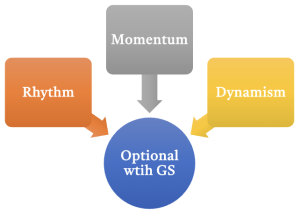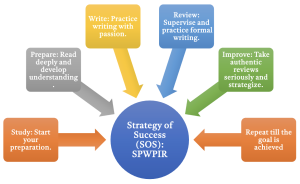- Scope of Optional Papers as per UPSC Notification
- The scope of the syllabus of the optional subject papers (Paper VI and Paper VII as per the syllabus) for the exam is of the level of BA Honours degree i.e. higher than the level of simple Bachelor’s degree and lower than the level of Master’s degree.
- In case of Engineering, Medical Science and Law, the level is in line with Bachelor’s degree.
- Quality Based Teaching and Optional Subject Papers: The above clarification present in the UPSC notification establishes the fact that you must have quality-based guidance to prepare for the optional subject successfully.
- Important Factors in Selecting Optional Subjects

- Aspirant’s interest in the subject: In the absence of this, it is difficult to understand the subject, reflect on it and develop comprehension and writing skills. Interest in the subject may be present from the beginning of preparation or may develop during the study. Hence, the candidate should study with patience.
- A sense of curiosity present in the aspirant for the subject; Interesting nature and dynamism of the subject: A sense of curiosity in the aspirant towards all the sub-topics of the optional subject is beneficial in preparation. Issues related to the optional subject appear daily in newspapers, magazines, civil life etc. Some topics are of such an interesting nature that their understanding cannot be developed without connecting them with the events happening around.
- Scoring potential of the subject: The scoring potential of the subject and the ability of the aspirants to score marks is also important. It depends more on the writing skills of the aspirant. If you have chosen Humanities-Literature-Social Science as an optional subject, then special emphasis should be given on writing skills. The main challenge of the aspirant is to present the knowledge and ideas from the mind on the answer paper as per the requirement of the question. It is worth noting that emphasis on skilled language organisation skills or vocabulary matters in writing efficiency.
- Relation with GS papers: However, this is like a double-edged sword because the level of the General Studies question paper is not of the level of the optional question paper. Therefore, the aspirant needs to be careful here. If you write an answer of the level of the optional subject in the General Studies question paper or do the opposite, then you will not get good marks.
- Length of the syllabus: Many a times aspirants choose the optional subject on the basis of the length of the syllabus. Often, they choose the optional subject whose syllabus seems shorter to them in comparison to other subjects. However, here the aspirant needs to be thoughtful. The presence of a list of sub-topics in the optional subject syllabus may make the syllabus look longer but it also gives the aspirant an idea of what to study, how and up to what level.
- Length and Depth Factor: Some subjects require in-depth study but their syllabus is less lengthy whereas some require covering a longer (topical) syllabus but not much depth. Hence, one should not choose an option directly by looking at the number of pages of the syllabus.
- Availability of reputed and authentic sources to study in the language and genre in which you are able to understand the syllabus. There are many types of study materials available today but there are very few good, meaningful books written by the teachers themselves. To resolve this problem, Prospect IAS has created excellent standardized study material and learning aid under the guidance of our faculty and civil services experts. You can see the sample of learning aids at the end of this document.
- Prior understanding of the subject in the candidate. Sometimes it is argued that it is necessary to have a prior knowledge of the optional subject. But this is not necessary and many successful aspirants have scored good marks by performing well in the optional subjects in which they had no prior knowledge or degree. It is worth noting that the quality of the teacher plays a decisive role in the selection of optional subject and better performance in it.
- The role of the teacher is important in each of the above. At Prospect IAS, only those teachers who have studied MPhil, PhD and from prestigious institutions like Delhi University, Jawaharlal Nehru University, Jamia Millia Islamia University etc and have NET-JRF in the optional subject teach optional subjects.
What is the importance of optional paper in UPSC exam?
- Aspirant’s Choice Prevail: It gives a strong preference to the aspirants as they choose the optional subject themselves. The marks obtained in this exam are used in merit calculation.
- Important to ensure success in the exam: General Studies paper does not leave much scope for scoring high/very good marks but optional paper has the potential to give a big lead in the exam. Hence it is important for a candidate to think well before choosing an optional paper. Below are some reasons to prove this fact.
- It has been found in the success of many successful aspirants that GS Mains (General Studies paper only) had about 50% share in their marks but optional paper had about 70% share in their marks.
- Selecting the wrong optional paper as an option increases the chances of losing at least 30 to 50 marks. This loss can be even more than this.
How to study optional subject – along with GS paper or separately?
- Before presenting any argument, it is necessary to make it clear that every
 aspirant makes the best strategy for himself. Prospect IAS’s Swadhyay model helps the candidates in this also. For more information contact Prospect IAS – +91-9821982104, +91-9821982107.
aspirant makes the best strategy for himself. Prospect IAS’s Swadhyay model helps the candidates in this also. For more information contact Prospect IAS – +91-9821982104, +91-9821982107. - However, you can prepare for optional subject along with the preparation of General Studies paper.
- Studying both together helps in maintaining rhythm, speed and dynamism in your preparation.
- Some aspirants consider it better to prepare for it as the last phase of
 preparation. Some are of the opinion that first they should clear the preliminary exam and then they will prepare for the optional. But this strategy is not effective because preparation for optional contributes to the preparation of the General Studies paper by increasing your intellectual capacity. According to Dr. Saurabh Bajpai Sir (Ex-Faculty DU, PhD JNU), Director of Prospect IAS, it is better to start the preparation of optional along with General Studies.
preparation. Some are of the opinion that first they should clear the preliminary exam and then they will prepare for the optional. But this strategy is not effective because preparation for optional contributes to the preparation of the General Studies paper by increasing your intellectual capacity. According to Dr. Saurabh Bajpai Sir (Ex-Faculty DU, PhD JNU), Director of Prospect IAS, it is better to start the preparation of optional along with General Studies. - It is worth noting that your preparation for optional should be completed before the first paper of your exam i.e. the preliminary exam, otherwise you can get stuck in the cycle of preliminary exam and then main exam.
SOS: Strategy of Success
Apply SPWRIR Strategy

UPSC Optional List/Optional Paper: Success Rate
| Optional Subject | Number of Candidates | Success Rate over the years (Percentage) | ||||||||||||
| Appeared | Recommended | |||||||||||||
| 2021-22 | 2020-21 | 2019-20 | 2021-22 | 2020-21 | 2019-20 | 2021-22 | 2020-21 | 2019-20 | ||||||
| Agriculture | 111
|
124 | 102 | 3 | 13 | 3 | 2.7 | 10.5 | 2.9 | |||||
| Animal Husbandry and Veterinary Science | 10 | 16 | 15 | 1 | 3 | 1 | 10.0 | 18.8 | 6.7 | |||||
| Anthropology | 1211 | 1189 | 797 | 100 | 108 | 65 | 8.3 | 9.1 | 8.2 | |||||
| Botany | 27 | 28 | 21 | 2 | 2 | 1 | 7.4 | 7.1 | 4.8 | |||||
| Chemistry | 153 | 156 | 114 | 15 | 13 | 12 | 9.8 | 8.3 | 10.5 | |||||
| Civil Engineering | 130 | 146 | 115 | 9 | 15 | 6 | 6.9 | 10.3 | 5.2 | |||||
| Commerce and Accountancy | 210 | 183 | 186 | 27 | 20 | 27 | 12.9 | 10.9 | 14.5 | |||||
| Economics | 236 | 243 | 200 | 31 | 26 | 23 | 13.1 | 10.7 | 11.5 | |||||
| Electrical Engineering | 170 | 200 | 164 | 15 | 16 | 17 | 8.8 | 8.0 | 10.4 | |||||
| Geography | 1322 | 1916 | 1993 | 95 | 105 | 101 | 7.2 | 5.5 | 5.1 | |||||
| Geology | 35 | 30 | 41 | 2 | 0 | 1 | 5.7 | 0.0 | 2.4 | |||||
| History | 581 | 751 | 848 | 24 | 51 | 52 | 4.1 | 6.8 | 6.1 | |||||
| Law | 167 | 186 | 201 | 23 | 19 | 27 | 13.8 | 10.2 | 13.4 | |||||
| Management | 38 | 54 | 59 | 6 | 6 | 8 | 15.8 | 11.1 | 13.6 | |||||
| Mathematics | 580 | 539 | 344 | 26 | 45 | 28 | 4.5 | 8.3 | 8.1 | |||||
| Mechanical Engineering | 201 | 213 | 152 | 22 | 12 | 9 | 10.9 | 5.6 | 5.9 | |||||
| Medical Science | 162 | 247 | 220 | 16 | 26 | 24 | 9.9 | 10.5 | 10.9 | |||||
| Philosophy | 347 | 439 | 463 | 20 | 27 | 42 | 5.8 | 6.2 | 9.1 | |||||
| Physics | 130 | 165 | 120 | 8 | 12 | 13 | 6.2 | 7.3 | 10.8 | |||||
| Political Science and International Relations | 1863 | 1662 | 1317 | 154 | 137 | 105 | 8.3 | 8.2 | 8.0 | |||||
| Psychology | 155 | 164 | 128 | 11 | 15 | 9 | 7.1 | 9.1 | 7.0 | |||||
| Public Administration | 509 | 705 | 726 | 38 | 58 | 67 | 7.5 | 8.2 | 9.2 | |||||
| Sociology | 1245 | 1263 | 1072 | 115 | 126 | 107 | 9.2 | 10.0 | 10.0 | |||||
| Statistics | 5 | 2 | 2 | 0 | 0 | 0 | 0.0 | 0.0 | 0.0 | |||||
| Zoology | 41 | 44 | 43 | 5 | 4 | 6 | 12.2 | 9.1 | 14.0 | |||||
| Literature of Assamese Language | 2 | 3 | 3 | 0 | 0 | 0 | 0.0 | 0.0 | 0.0 | |||||
| Literature of Bengali Language | 2 | 1 | 4 | 0 | 0 | 0 | 0.0 | 0.0 | 0.0 | |||||
| Literature of English Language | 27 | 31 | 21 | 6 | 3 | 3 | 22.2 | 9.7 | 14.3 | |||||
| Literature of Gujarati Language | 49 | 85 | 91 | 4 | 3 | 6 | 8.2 | 3.5 | 6.6 | |||||
| Literature of Hindi Language | 226 | 191 | 236 | 19 | 13 | 15 | 8.4 | 6.8 | 6.4 | |||||
| Literature of Kannada Language | 83 | 124 | 79 | 7 | 17 | 4 | 8.4 | 13.7 | 5.1 | |||||
| Literature of Maithili Language | 31 | 53 | 41 | 3 | 2 | 1 | 9.7 | 3.8 | 2.4 | |||||
| Literature of Malayalam Language | 93 | 105 | 85 | 10 | 13 | 9 | 10.8 | 12.4 | 10.6 | |||||
| Literature of Manipuri Language | 4 | 7 | 11 | 1 | 0 | 1 | 25.0 | 0.0 | 9.1 | |||||
| Literature of Marathi Language | 9 | 6 | 7 | 1 | 0 | 0 | 11.1 | 0.0 | 0.0 | |||||
| Literature of Oriya Language | 2 | 3 | 4 | 0 | 0 | 0 | 0.0 | 0.0 | 0.0 | |||||
| Literature of Punjabi Language | 25 | 18 | 19 | 3 | 1 | 3 | 12.0 | 5.6 | 15.8 | |||||
| Literature of Sanskrit Language | 39 | 53 | 54 | 1 | 2 | 2 | 2.6 | 3.8 | 3.7 | |||||
| Literature of Sindhi (Arabic) Language | 1 | 2 | 2 | 0 | 1 | 0 | 0.0 | 50.0 | 0.0 | |||||
| Literature of Tamil Language | 64 | 77 | 73 | 4 | 5 | 8 | 6.3 | 6.5 | 11.0 | |||||
| Literature of Telugu Language | 36 | 32 | 57 | 5 | 1 | 3 | 13.9 | 3.1 | 5.3 | |||||
| Literature of Urdu Language | 11 | 18 | 16 | 1 | 2 | 3 | 9.1 | 11.1 | 18.8 | |||||
